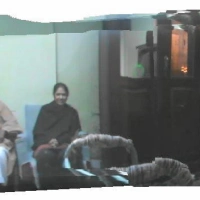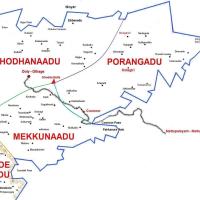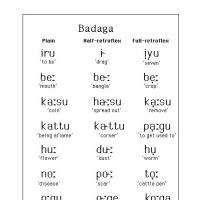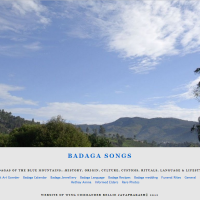The elder, placing his/her right hand [or both hands] on top of the head of the youngster would bless [broadly] with the following words – footwear [kevaru / mettu]as well as the headgear [cap/kovili or turban / mandare] would be removed before blessings are sought / offered.
The elderly person blesses as ‘ Ondhu Nooru, Saavira Agili [let one become a hundred and then a thousand]; Somi, harachavu,sogavu kodili [may God give good health and happiness]; Hoppa eday, bappa eday ella ollithay barali [let only good things happen while going out or coming back]‘ This tradition not only ensures respect to elders but also shows the close bond. Incidentally, open palms -where the nerves end, is supposed to transmit positive vibrations. Thus, the open palms placed on the head, is the ultimate way of blessing.
If you are new to this custom, it may make us a bit uneasy [ashamed is a very strong word] but when you get used to it, this is pure bliss. Let us start seeking the blessings from the most neglected elders – our parents.
ondhu, ompaththu aagali,
ondhu, saavira aagali,
harachchava kodali, sogava kodali,
baNda hechchali, badhukku hechchali,
bE hechchali, haalu hechchali, haNNu hechchali,
mane katti, maaru kattili,
ondhu mane, saavira mane aagali,
beNNE bettu aagali, thuppa theppa aagali,
hulla muttile hoo aagali, kalla muttile kaai aagali,
honna muttilE sinna aagali,
bettadhudhu bandhalEyu, beraluga adangali,
attudhadhu bandhalEyu, aangai adangali,
Kattidhadhu kareyali, biththidhadhu baeyali,
aanaiya balava kodali, ariyaa siriyaa kodali,
budhdhi bevarava kodali,
uri hOgi, siri barali, siri sippaaththi agali,
HOppa ede, bappa ede ellaa, oLLiththe barali,
nooru thumbi, naadu jaradhu, dheera pooraNa aagi,
OLLiththa Eththi, Hollava ThaLLi, olagodho ellaava Gedhdhu,
sangatta salippu illaadhe,
hoppa dhaari, Bappa Dhaari yo, edinjilu iLLaadhe,
padipPeri mundhuga hesareththi,
kumbE kudi haradha engE, angaalu muLLu muriyaadhE,
kO endhu korachchi, bO endhu bokki,
ManE thumba makka hutti, gOttu thumba sosE kondu,
paava pariya nOdi, olagadha hesaru eththi
badhukki baa
ஒந்து, ஒம்பத்து ஆகலி,
ஒந்து, சாவிர ஆகலி,ஹரச்சவ கொடலி, சொகவ கொடலி,
பண்ட ஹெச்சலி, பதுக்கு ஹெச்சலி,
பே ஹெச்சலி, ஹாலு ஹெச்சலி, ஹண்ணு ஹெச்சலி,
மனே கட்டி, மாரு கட்டிலி,
ஒந்து மனே, சாவிர மனே ஆகலி,
பெண்ணே பெட்டு ஆகலி, துப்ப தெப்ப ஆகலி,
ஹுல்ல முட்டிலே ஹூ ஆகலி, கல்ல முட்டிலே காய் ஆகலி,
ஹொன்ன முட்டிலே சின்ன ஆகலி,
பெட்டதுது பந்தலேயு, பெரலுக அடங்கலி,
அட்டுதது பந்தலேயு, ஆங்கை அடங்கலி,
கட்டிதது கரேயலி, பித்திதது பேயலி,
ஆனைய பலவ கொடலி, அரியா சிரியா கொடலி,
புத்தி பெவரவ கொடலி,
உரி ஹோகி, சிரி பரலி, சிரி சிப்பாத்தி அகலி,
ஹோப்ப எடே, பப்ப எடே எல்லா, ஒள்ளித்தே பரலி,
நூரு தும்பி, நாடு ஜரது, தீர பூரண ஆகி,
ஓள்ளித்த ஏத்தி, ஹொல்லவ தள்ளி, ஒலகொதொ எல்லாவ கெத்து,
சங்கட்ட சலிப்பு இல்லாதெ,
ஹொப்ப தாரி, பப்ப தாரி யொ, எடிஞ்சிலு இல்லாதெ,
படிப்பேரி முந்துக ஹெசரெத்தி,
கும்பே குடி ஹரத எங்கே, அங்காலு முள்ளு முரியாதே,
கோ எந்து கொரச்சி, போ எந்து பொக்கி,
மனே தும்ப மக்க ஹுட்டி, கோட்டு தும்ப சொசே கொண்டு,
பாவ பரிய நோடி, ஒலகத ஹெசரு எத்தி
பதுக்கி பா
English Translation
Let prosperity/good deeds increase nine folds,
[ondhu – one, ombaththu – nine, aagali – happen]
Let a prosperity increase a thousand times,
[saavira – thousand]
Let good helath and happiness be bestowed
[haracha – health, soga – happiness, kodali – given]
Let the cattle wealth / livestock (number of buffalows and cows) increase
[banda – cattle]
Let wealth increase
[badhukku – wealth]
Let the (sown) crops increase
[bay – crops)
Let the milk (yield) inncrease
[haalu – milk]
Let the fruits increase
[hannu – fruits]
May you build (your own) a house
[manay – house, katti – build]
May you get married
[maaru katti – marriage]
Let one house become a thousand
[may your family increase]
Let the butter [yield] grow like mountain,
[bennay – butter, bettu – mountain]
Let ghei (made from clarified butter) become large well
[thuppa – ghei, theppa – well]
Let grass turn to flowers and stones to fruits when touched
[Hullu – grass, muttilay – to touch, hoo – flower, kallu – stone , kaai – unripe fruit]
Let iron turn to gold
[Honna – iron, sinna – gold]
Even if trouble comes in huge amount like a mountain, let it be contained in a finger
[betta – mountain, bandalay – coming, beralu – finger, adangali – contained]
Even if trouble comes like a deep valley, let it be contained in the palm (fist)
Let the cow give milk,
[kattidhadhu – tied cow, karayali – to milk]
Let whatever is sown, grow well
[biththidhadhu – sown, bayyali – grow well]
Let the strengh of Elephant be bestowed (on you)
[Aanay – elephant, bala – strengh]
Let a lot of happiness be given,
[siri – happiness]
May you become intelligent and wise
[budhdi – intelligence, bevara – wisdom]
Let jealousy vanish and happiness prevail
[uri – jealousy /envy]
Let happiness increase manyfold
[sippathi – manyfold]
Let only good things happen wherever you go and come
[Hoppa – going, bappa – coming, eday – place, olliththu – goodness]
Let you live to be a full hundred with lots of wisdom so as to make others wonder(envious)
[nooru – hundred, thumbi – full/filled, naadu – nation/others, jaradu – envious, Deera – wisdom, poorana – complete /lots, aagi – become]
Take only the good and leave behind the bad
[olliththu – good,eththi – take, holla’va – bad, thalli – leave behind]
May you win all in this world
[olaga – world, ellava – all, geddhu – win]
without any worries and problems,
[sangatta – worries, salippu – problems/hesitation]
Let there be no hinderance on your ways
[dhaari – path /way, edinjallu – hinderance]
Let you come up in life with wisdom given by education
[paddippu – education, mundhuga – coming forward]
Like a pumpkin plant that grows and spreads
[kumba kudi – pumpkin plant, haradu – spread]
Let not thorns stop your steps
[Aangaal – foot, mullu – thorn, muriyadhay – embed (in the sole)
Let your name and fame spread wide and far and called by all and overflow
[korachi – calling, bokki – overflow]
Let your home be filled with children
[makka – children, hutti – born]
and let there be many daughters in law
[gottu – corner, thumba – full,sosay – daughter in law]
May you look after your dear and near ones
[pava paria – near and dear ones]
Earn a great name in this world
[hesaru – name, eththi – earn]
And live with PROSPERITY
(sources :My mother B.Idyammal , Appukodu Lakshmi Ammal, Balasubramaiam’s ‘Paame’, Sivaji Raman’s ‘Badaga Samudhaayam’ and my own interaction with Badaga elders)
:::::::::::::::::::::::::::::::::::::::::::::::::::::::::::::::::::::::::::::::::::::





















 Mookuthi
Mookuthi  Chinna
Chinna 






 ==
==


![Seemae [See'may] & Morae [Mo'ray] (relationship)](https://i0.wp.com/badaga.wordpress.com/files/2008/11/nakku-betta1.jpg?resize=200%2C200)









































